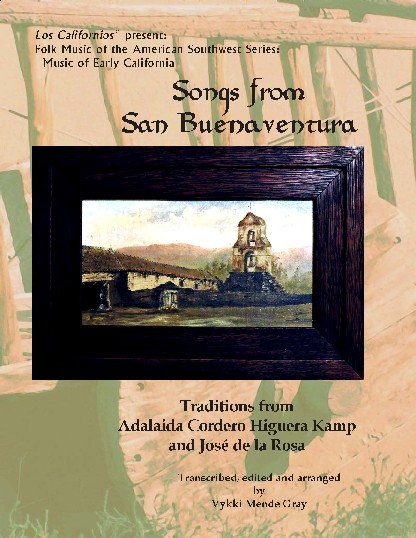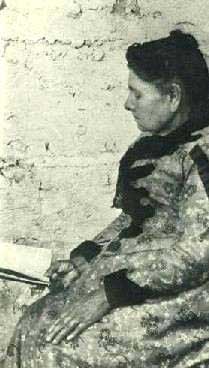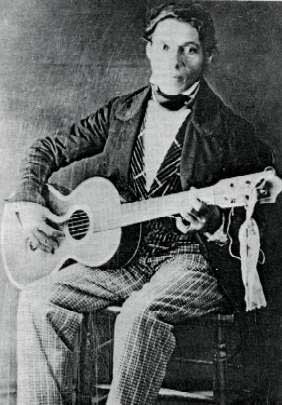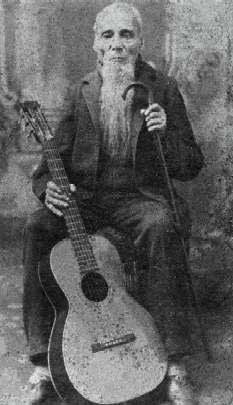Los californios® Home |
Resumé |
Events |
Wares |
Order Form |
Sitemap |
Contact |
Portal
|
||||||||||||||||||||||||||||||||||||||||||||||||||||||||||||||||||||||||||||||||||||||||||||||||||||||||||||||||||||||||||||||||||||||||||||||||||||||||||||||||||||||||||||||||||||||
Songs from San Buenaventura:
Vykki Mende Gray 
Item Number: BK-208 CAL $15.00Description | Contents | Adalaida Cordero Higuera KampIn l904, Charles Fletcher Lummis recorded some twelve hours of songs in an attempt to preserve the old music of California. With his charter in hand for the Southwest Society, a chapter of the Archaeological Institute of America, he purchased an Edison wax cylinder recording machine and proceeded to “catch our archaeology alive” by recording the disappearing songs of the californios and Native Americans. Lummis recorded hundreds of songs from californio and indio descendants, as well as from descendants of Mexican immigration from the early American period. One of his informants was Adalaida Kamp. Those of the Edison wax cylinders that are still extant have moved from the Southwest Museum’s Braun Research to The Autry Center. This music book reflects a small part of that collection — specifically the songs that Lummis collected from Adalaida Cordero Higuera Kamp. Many of these pieces are included in the ten-volume Music of Early California collection, although they are scattered among the various years. But a number of pieces not previously transcribed are also included. Like our other books, the format features the melody line, with a harmony line for most pieces and guitar chords (not charts, just names of chords) for all but the Napa Indian Song. The book is comp bound for ease of use. Click here for order form.Table of Contents
Adalaida Cordero Higuera Kamp and José de la Rosa
Doña Adalaida Kamp was descended from the Higuera family that came to California in the 1780s. Adalaida’s mother was known for writing poetry and, like Adalaida, for improvising verses to songs — a valued skill not only in California, but also in Spain and many of the former Spanish colonies. Adalaida’s recordings represent some of the oldest extant songs from California. They are also the most difficult to transcribe. Adalaida was in her mid-sixties in 1904 when she made these recordings — not very old these days, but at that time she was well beyond her singing prime. Her singing is enthusiastic and sometimes even robust, her memory of the tunes phenomenal, but her pitch is not always true and her rhythm varies, so transcribing the pieces involves a fair degree of analysis. Luckily, the results are worth the trouble — these are also some of the prettiest and most unique of the pieces Lummis documented, with a strong portrayal of the californio sense of humor and independent spirit. Doña Adalaida grew up learning songs in the household where José de la Rosa, known affectionately as Don Pepe, resided. We see him here both as a young man and in his later years. Don Pepe, sometimes credited with being California’s
|
||||||||||||||||||||||||||||||||||||||||||||||||||||||||||||||||||||||||||||||||||||||||||||||||||||||||||||||||||||||||||||||||||||||||||||||||||||||||||||||||||||||||||||||||||||||
|
Los californios®
is a registered trademark belonging to San Diego Friends of Old-Time Music, Inc., Contact Los californios® at info@loscalifornios.com. Find Los californios® on Facebook. © Vykki Mende Gray, 2020 Web design: Ellen Wallace and Vykki Mende Gray Portal | Los californios® | History of This Music | Padua Hills Theatre | San Diego Friends of Old-Time Music | Sitemap |



